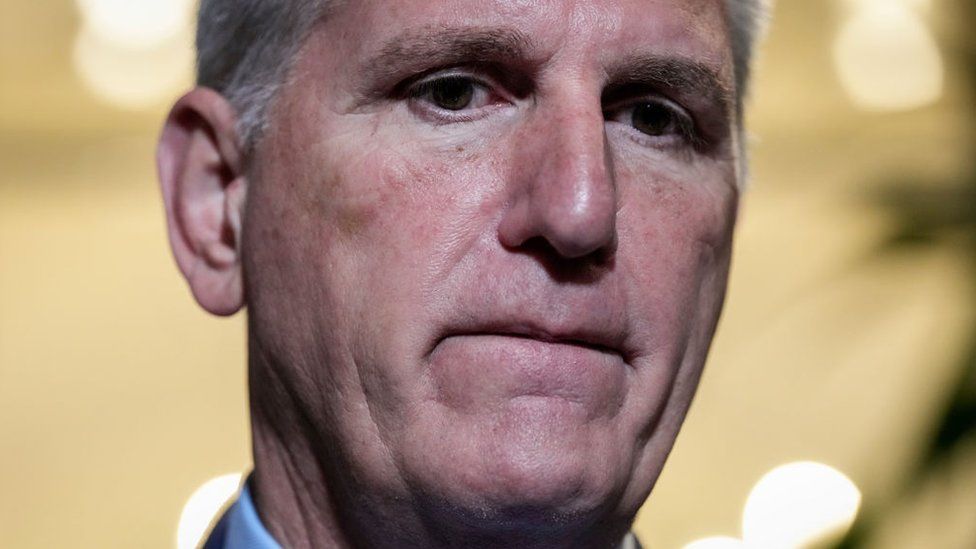There are less than five days to go before the US government shuts down and Kevin McCarthy has a choice to make.
The Speaker of the US House of Representatives must either find a way for his narrow Republican majority to fund federal agencies or seek the help of Democrats to do so.
If he opts for the former, he will likely pass a bill that cannot make it through a Democrat-controlled Senate, practically ensuring a shutdown.
But if Mr McCarthy decides on the latter, he is at risk of being ousted from the job that has been the pinnacle of his two decades in politics.
Whichever way the California congressman goes, he will have to do it sooner rather than later.
If Congress fails to provide funding by midnight on Saturday, hundreds of thousands of federal employees will be furloughed without pay and government services will be disrupted.
- What happens in a US government shutdown?
- Republicans leave Washington with shutdown looming
This dilemma has been months in the making for Mr McCarthy, 58, amid a growing ideological gulf between the moderate and hard-right wings of his caucus.
That right-wing flank only accounts for a handful of lawmakers, but in a chamber that Republicans hold by only nine seats, they hold an out-sized power over proceedings.
Fiercely opposed to anything that resembles business as usual in Washington, they demand that the party deliver on spending cuts and what they call conservative priorities.
In January, these members of Congress held out for 15 dramatic rounds of voting before Mr McCarthy finally won their support to hold the speaker’s gavel.
In June, the country narrowly averted a catastrophic default on its national debt after hard-liners threatened to derail negotiations with the White House if they did not get concessionary savings.
Mr McCarthy hailed the package that ultimately passed as “the biggest cuts and savings this Congress has ever voted for”, but several of his members fumed that more Democrats had voted for it than Republicans, essentially coming to his rescue.
This latest fight has seen about half a dozen or so ultra-conservatives declare that they are willing to oversee a lapse in government funding to force through cuts in spending.

Chief among this vocal minority’s demands is a strong opposition to more military aid to Ukraine, which one member – far-right Georgia Congresswoman Marjorie Taylor Greene – has called “blood money”.
Russia’s full-scale invasion of its neighbour is in its 19th month and the US Congress has approved about $113bn (£93bn) in aid, including more than $43bn (£35bn) in direct military commitments.
A majority of both parties in Congress say they intend to fulfil the White House’s latest $24bn (£19bn) request, but most Republican voters oppose additional funding to support Ukraine.
Other lawmakers in the group have argued that federal agencies have been “weaponised” against Republicans by President Joe Biden and their funding needs to be scaled back.
Backing these incendiary rebels is none other than former President Donald Trump, who wrote Monday on his Truth Social platform: “UNLESS YOU GET EVERYTHING, SHUT IT DOWN!”
That means, as the clock ticks down, Mr McCarthy is in the unenviable position of looking to the opposing party to bail him out, as it did during the debt ceiling showdown.
Working with Democrats is all but assured to trigger a so-called motion to vacate, the first step in forcing a vote to oust him as speaker.
Among the new House rules Mr McCarthy agreed to in order to get the gavel in January, only one lawmaker – Democrat or Republican – is needed to raise such a motion.
Congressman Matt Gaetz, a firebrand from the Florida panhandle, has already publicly threatened for the better part of a month that he will bring a motion to vacate against Mr McCarthy if he cuts a deal.
Given that the Speaker recently opened an impeachment inquiry into President Biden and has otherwise vexed his House rivals this year, it remains unclear if Democrats would vote to save him in such a scenario.
It is a crossroads the Bakersfield, California native likely hoped he would never have to face.
Before being elected Speaker this year, the great-grandson of an Irish labourer had previously sought out the role eight years ago.
When he finally won the gavel that instantly made him one of the most powerful people in Washington, in January, Mr McCarthy declared: “It’s not how you start, it’s how you finish.”
He may now be hoping he does not have to eat those words.
